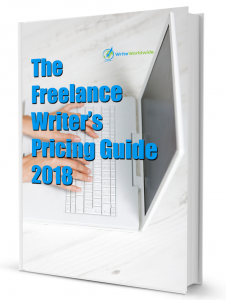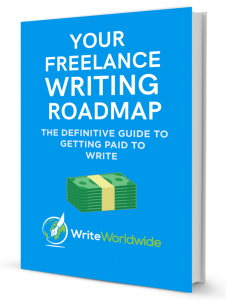Are you finding it difficult to become a well-paid freelance writer?
With all the information online about how to become a freelance writer it can be difficult deciding what to implement and what to ignore.
Fortunately, when I started my writing career I found a simple blueprint that I followed to the tee. That blueprint helped me earn my first $1,000 in only a few months. And now a year on I am earning well and have a thriving writing business, with my highest grossing month being $3,600.
If you’ve been following this blog for a while you can probably guess what the blueprint was and you know where to find it. If not, here’s the link to Bamidele’s Earn Your First $1,000 Writer Challenge.
Dare I say that’s all you need to succeed as a writer?
Seems stupid of us to share content that’s obviously in competition with us right? Well, that’s not our philosophy at WriteWorldwide.
Our philosophy is to share as much valuable information as possible to help you succeed as a writer. If it means sharing someone else’s work, advice, or content, then so be it.
Now, recently Bamidele reached out to myself and Richard Rowlands because he wanted to feature us in his new ebook: How They Started. The book details how four writers when from zero to four figures in monthly income.
One of the questions Bamidele asked in that book was: “What Would you do if you had to start again?”
Today I wanted to share my exact answers with you. Bamidele has kindly agreed that I can share this information with you.
My Proven BluePrint to Break Into Freelance Writing (And Earn Well)
Here’s what I would do:
1. Position myself – whether that’s by niche (e.g. technology writing) or service (blog posts, guest posts and magazine articles).
2. Decide on my rate to start – this would be between $0.10-$0.15/word.
3. Build a writer’s website with the following key pages: about, services, contact, and hire me page. I would build a simple one-page site to start. It doesn’t have to be perfect; the key is to get going. I can always change it with time.
4. Establish my online presence by updating my Twitter, Facebook, and LinkedIn pages to reflect that I’m a writer.
5. Build social proof to command higher rates.
- Select and pitch a few major publications such as Huffington Post and Entrepreneur
- Find the decision maker and their email addresses by using email finding apps such as Hunter
- Pitch the decision maker of these publications – such as the editor – to stand out from the many submissions on their contact forms
- Keep these pitches short because editors are busy people
- Once I have one major publication, I will forget about this step and move on. One is enough to boost your credibility in the client’s eyes, even if you’re a beginner in yours
6. Build a prospect list of websites and publications I want to pitch.
It will be a list of 100 prospects. To speed up the time it takes to build a list and also to create a targeted list, I’ll target writers in my niche or niches and see who they write for.
- Find the decision maker and their email address
- Document this list in an excel sheet
7. Pitch those publications using a proven cold pitch.
- Follow up with each of those prospects using the 3-7-7 formula. With this method, you follow up three days later if you hear nothing. You do the same seven days after that follow-up, and then another seven days after the last. If you still hear nothing, consider it a dead lead.
- Document my progress in an excel sheet to make sure I’m on top of it all.
On paper these steps are simple. The reality though is that they’re only as effective as the effort you put in.
You need to put in the hard work.
I can’t promise you an easy ride. There all be lots of stuff that you need to figure out on your own. But, what I can promise you is that if you take one small step at a time, those little steps will add up and before you know it, you’ll have a lucrative writing business.
So, what are you waiting for?
Follow this template and share your progress with us, either below in the comments or via email at hello at writeworldwide.com




awesome! This was very helpful.
Hi Nancy,
You’re welcome 🙂
Cheers,
Nick
Thanks a bunch for cranking out this highly meaningful article..
Hi Peter,
You’re welcome.
Cheers,
Nick
Hi Nick, I have a problem finding the decision makers. I have found 100+ companies in my niche. The names of the decision makers(e.g. marketing director, content manager) of 30-35 companies are available on Google. But rest of the 60-70 companies are mum about their decision makers. My search couldn’t reveal those prospect names. If I get the name of the decision makers, I can then guess their email address using rapportive or such tools. How can I find these names? It’s not possible to buy any expensive tools for me right now.
Hi Sayed,
Thanks for your email. I’d suggest that you use a combination of LinkedIn, Google, their website and email finding apps. By doing that I’ve always managed to find the decision makers. Sure, sometimes it takes a little longer to find the decision makers, but that’s just part of the game. You’ll have to do some digging.
I’d say LinkedIn is your best bet. Most companies have LinkedIn profiles. On their profiles click on “see all employees on LinkedIn”. Go through the list to find content marketers, content managers, content directors, editors, and other decision makers you’re looking for. Because some companies have hundreds and thousands of employees use the search feature to narrow down your results with keywords. For example, you could simply type in “content manager” if the right decision maker doesn’t appear on the first few pages.
I hope this helps.
Cheers,
Great article Nick. Will definitely have to follow this blue print this year. What advice do you have for someone like me – who has failed to zero down on one niche?
Hi Martha,
Thank you. I was and to some degree, still am in the same boat as you. I wasn’t able to nail down a niche, but what I did do was focus on the services I have to offer and then provide those services across several industries (niches). I chose several niches simply based on my interest and whether I was comfortable writing about them.
Often our niche only becomes clear as we experiment and write about more niches (and if it doesn’t become clear, well you can always continue writing in several niches. Who says you have to be an expert in one?).
You quickly see what you like and what you don’t. I know, for example, that I’ll never write about garage doors again haha.
Hope this helps 🙂
Cheers,
Nick
Hello Nick!
Can we go solo without a site if it is not possible at the time? Also, I would really like to know about the actual writing itself!!! What resources would recommend to people starting their FLW who (to be honest) are not the best writers? What actual resources did you find helpful in strengthening your writing skills, grammar/punctuation, and voice? (Although I am sure, practice is obviously one of the firstnforemost)
Hi Jesse,
It’s definitely possible to go solo without a site when you’re starting, but having one just increases the chances of success over the long term. It makes you look and feel like a professional.
Besides in today’s age, why not make use of the technology that’s out there. I’m actually in the process of putting together a post on this. I asked this question in a Facebook writing group and found that some people actually achieved great success without a website. I think I’ll be interviewing one of those people.
As for strengthening your writing skills…Well one of the first resources I came across was the book “On Writing Well: The Classic Guide to Writing Non-Fiction.” I instantly became hooked on writing and the power of simplifying things. So, I’d suggest starting with that.
If you need further help, there are plenty of resources on this blog to help you:
1) The Ultimate Guide on How to Improve Your English Writing Skills (I use a couple of the tools listed there to improve my writing, namely: Hemingway Editor and Grammarly)
2) Write Better Blog Posts: How to Make Your Boring Posts More Exciting
3) 10 Books That Will Make You a Better Freelance Writer
Hope this helps.
Cheers,
Nick
Thanks Nick for this post. I have a blog with and decided to settle down with PERSONAL DEVELOPMENT as a Niche. Is it really a profitable niche because i have not being able to land a contract yet.
Though i have been published in Stevenaitchison and Thrive Global sites.
Hi Gideon,
I see you posted the same question here as one another post. I’ll share the same answer I gave there:
“The personal development niche is very saturated and broad. I think if you want to achieve success with it, you really need to niche down even more, perhaps by focusing on mental health or something. I’m also not sure how profitable it as I have limited experience with it.”
Best,